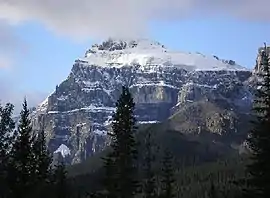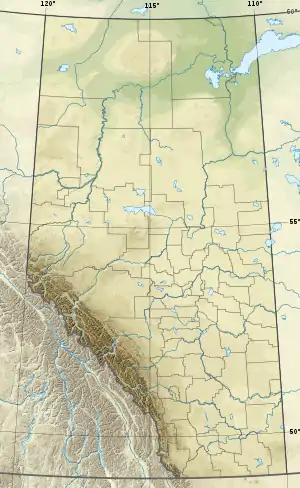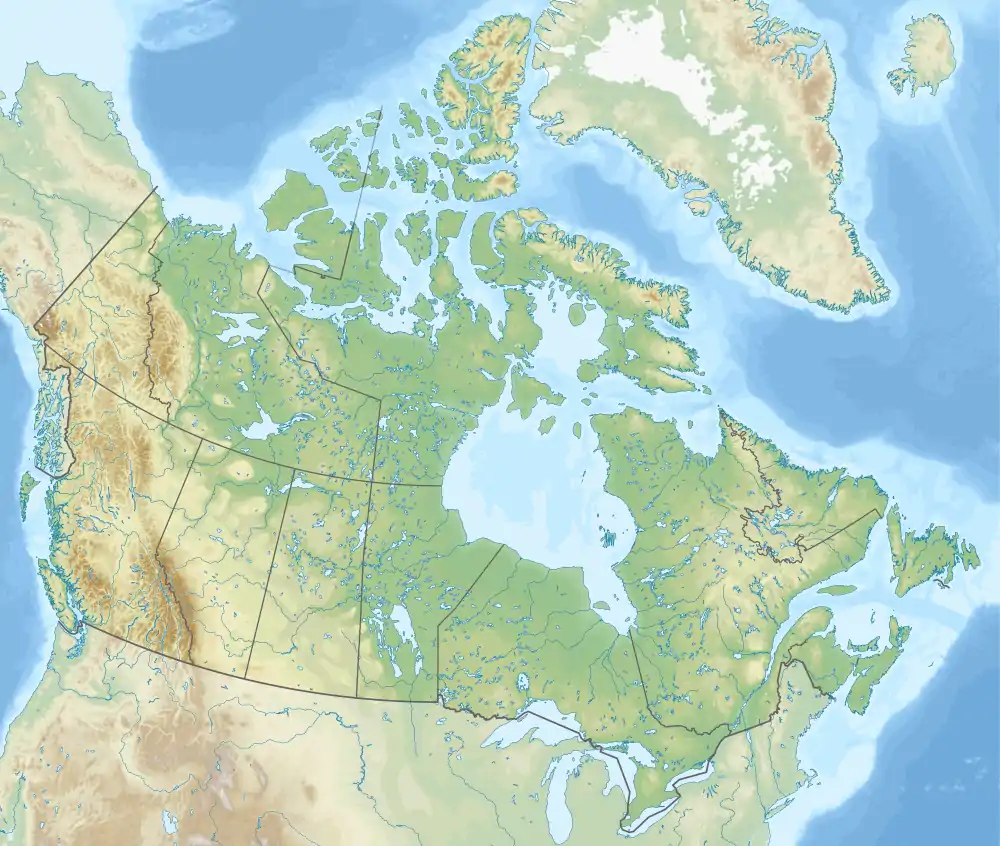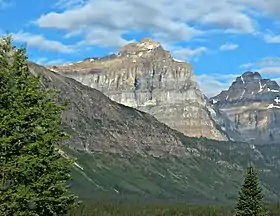Epaulette Mountain
Epaulette Mountain is a 3,094-metre (10,151-foot) mountain summit located between the Howse River valley and Mistaya River valley of Banff National Park, in the Canadian Rockies of Alberta, Canada. Its nearest higher peak is Mount Sarbach, 3.64 km (2.26 mi) to the northwest.[4] Epaulette Mountain is situated south of Saskatchewan Crossing, where the Icefields Parkway intersects with the David Thompson Highway. Descriptively named for the shoulder ornament on some military uniforms, a glacier seems to hang on a narrow shelf above the steep cliffs and was thought to resemble an epaulette. Epaulette is a French word which means "little shoulders" (epaule, referring to "shoulder").[1]
| Epaulette Mountain | |
|---|---|
 Epaulette Mountain seen from Icefields Parkway | |
| Highest point | |
| Elevation | 3,094 m (10,151 ft) [1] |
| Prominence | 259 m (850 ft) [1] |
| Parent peak | Mount Chephren (3274 m)[1] |
| Listing | Mountains of Alberta |
| Coordinates | 51°51′57″N 116°44′06″W [2] |
| Geography | |
 Epaulette Mountain Location of Epaulette Mountain in Alberta  Epaulette Mountain Epaulette Mountain (Canada) | |
| Location | Alberta, Canada |
| Parent range | Waputik Mountains Canadian Rockies |
| Topo map | NTS 82N15[2] |
| Geology | |
| Age of rock | Cambrian |
| Type of rock | Sedimentary |
| Climbing | |
| First ascent | 1924 by F.V. Field, W.O. Field, Edward Feuz Jr.(guide)[3] |
| Easiest route | technical climb |
History
The first ascent of Epaulette Mountain was made in 1924 by F.V. Field, W.O. Field, and guide Edward Feuz Jr.[3] The mountain's name was officially adopted in 1961 by the Geographical Names Board of Canada.[2]

Geology
Like other mountains in Banff Park, the Epaulette Mountain is composed of sedimentary rock laid down during the Precambrian to Jurassic periods.[5] Formed in shallow seas, this sedimentary rock was pushed east and over the top of younger rock during the Laramide orogeny.[6]
Climate
Based on the Köppen climate classification, Epaulette Mountain is located in a subarctic climate zone with cold, snowy winters, and mild summers.[7] Temperatures can drop below -20 °C with wind chill factors below -30 °C. Precipitation runoff from Epaulette Mountain drains into the Mistaya River and Howse River which are both tributaries of the North Saskatchewan River.
References
- "Epaulette Mountain". Bivouac.com. Retrieved October 14, 2018.
- "Epaulette Mountain". Geographical Names Data Base. Natural Resources Canada. Retrieved October 15, 2018.
- "Epaulette Mountain". PeakFinder.com. Retrieved October 15, 2018.
- "Epaulette Mountain, Alberta". Peakbagger.com. Retrieved November 10, 2019.
- Belyea, Helen R. (1960). The Story of the Mountains in Banff National Park (PDF). parkscanadahistory.com (Report). Ottawa: Geological Survey of Canada. Archived (PDF) from the original on October 2, 2015. Retrieved September 13, 2019.
- Gadd, Ben (2008). Geology of the Rocky Mountains and Columbias.
- Peel, M. C.; Finlayson, B. L.; McMahon, T. A. (2007). "Updated world map of the Köppen−Geiger climate classification". Hydrol. Earth Syst. Sci. 11: 1633–1644. ISSN 1027-5606.